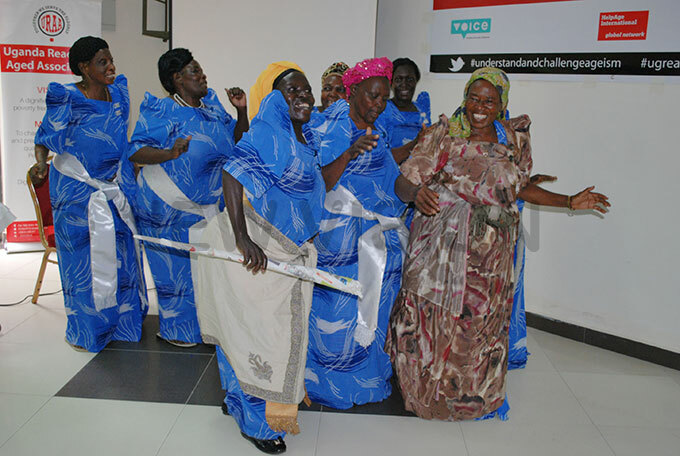97% of older persons suffer discrimination in Uganda
“We queue up in banks and it is even worse at health facilities because sometimes the lines are long and we end up without getting any medication,”
HEALTH
As older persons, we are disadvantaged in several ways. When you walk to the bank, they cannot give us loans because we are considered as high-risk borrowers.
Even National Agricultural Advisory Services (NAADS) officials cannot give us farm inputs because they think we are too weak to engage in farming activities. At functions, they do not allow us to dance.
Consequently, we are only welcome at funerals. But even then questions such as who is the next person to die come up.
Parliament of Uganda has an insurance scheme but it stops only at the age of 65. So that is how bad it gets, said John Orachi who is the chairperson for older persons council.

Old persons dancing (Photo by Agnes Kyotalengerire )
Teopista Ssekiwunga another older person said there is a need for special care and support for older persons.
"We queue up in banks and it is even worse at health facilities because sometimes the lines are long and we end up without getting any medication," Ssekiwunga said
She added, in the past children would support older persons and even volunteer to carry their luggage. Government has not played their role to train the young generation to support and love older persons.
Another Scolastic Nasinyama who is the executive secretary for the national council of older persons at the ministry of gender, labour and social development said older persons have lost their values.
"In the past older persons were seen as fountains of wisdom. But now people in the communities regard them as witches, "Nasinyama said.
The concerns for older persons were revealed during the national validation workshop on ageism research at Piato Restaurant in Kampala on Wednesday.
According to UN definition, an older person is someone aged 60 and above.
The validation workshop organized by Uganda Reach the Aged Association (URAA) together with HelpAge International, ministry of gender and Makerere University with funding from Oxfam/Voice.
The workshop created a platform for discussion on the findings of ageism research that was conducted in the six districts of Soroti, Nakapiripiriti, Adjumani, Kabale, Kitgum, and Kawempe in Kawempe division to understand and challenge ageism in Uganda.
The research findings revealed that nearly 97% of older persons reported at least one or more forms of ageism. The same report indicated that more than half 57% of older persons were given support because of their older age.
Orachi described ageism as discrimination based on age and it is manifested in various spheres.
For example discrimination in health where they are mistreated in health facilities and lack access to health care, economics where they are denied employment and access to credit services in form of a loan.
In the politic sphere with limited representation in parliament and negative perception by young people and socially where the older persons are neglected, isolated, bullied and some even lose their property.
Orachi blamed discrimination on lack of awareness, negative attitude and lack of respect for older persons, especially by young people.
Frederick Ouma Bwire who is the chief executive officer URAA said if the older persons are experiencing the discrimination based on age and we do not arrest the situation as fast as possible, it means that we shall have a bigger problem in future when the younger population has aged.
The commissioner for disability and elderly at the ministry of gender, Sam Masaba Wekesa is optimistic that with such research-based findings, the older persons will have grounds to fight the vice.
Over the years the population of older persons in Uganda has been growing steadily. According to Uganda UBOS, 2002, older person's population stood at 1.1 million; in 2010 UBOS report estimated it at 1.3 million and in 2013, the population stood at 1.6 million.
The United nation projects that by 2050, the population of older persons in Uganda will have increased to 5.5 million.
As part of the workshop activities, the older persons entertained guests with a skit depicting the various forms of discrimination.